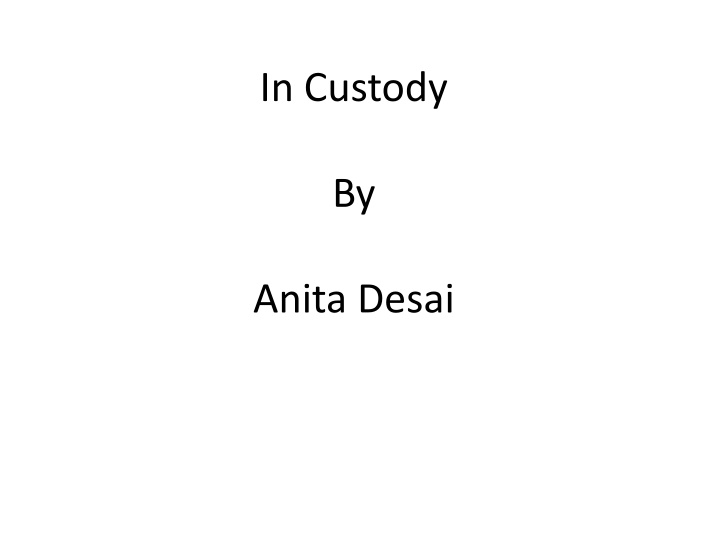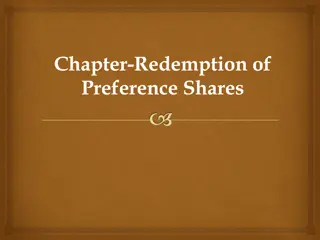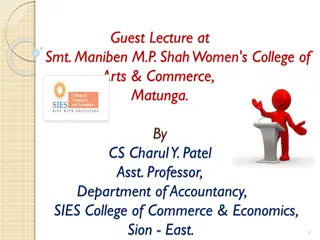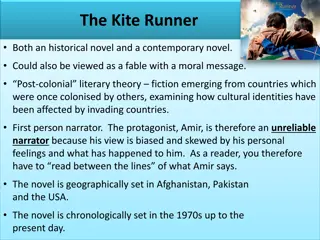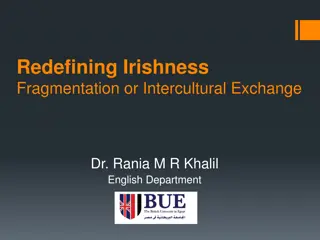In Custody: A Story of Identity and Redemption
In Anita Desai's novel "In Custody," protagonist Deven Sharma grapples with feelings of failure and dissatisfaction as he navigates his unfulfilled dreams of becoming a renowned Urdu poet. When presented with the opportunity to interview his idol, Urdu poet Nur Shahjehanabadi, Deven sees a chance to revive the purpose in his life. However, as he delves deeper into Nur's world, Deven is confronted with the harsh reality of a once-great poet's downfall and the complexities of identity and meaning.
Download Presentation

Please find below an Image/Link to download the presentation.
The content on the website is provided AS IS for your information and personal use only. It may not be sold, licensed, or shared on other websites without obtaining consent from the author.If you encounter any issues during the download, it is possible that the publisher has removed the file from their server.
You are allowed to download the files provided on this website for personal or commercial use, subject to the condition that they are used lawfully. All files are the property of their respective owners.
The content on the website is provided AS IS for your information and personal use only. It may not be sold, licensed, or shared on other websites without obtaining consent from the author.
E N D
Presentation Transcript
In Custody By Anita Desai
About the Author Anita Desai BornAnita Mazumdar 24 June 1937 (age 84) Mussoorie, Princely State of Tehri Garhwal, British India(present- day Uttarakhand, India)OccupationWriter, professorNationalityIndianAlma materUniversity of DelhiPeriod1963 presentGenreFictionNotable worksIn Custody; Baumgartner's Bombay SpouseAshvin DesaiChildren4, including Kiran Desa
In Custody is a novel written in the year 1984 by a renowned Indian-American author Anita Desai. The book is about searching for identity and meaning in life. In the first chapter, the audience is introduced to a young man named Deven Sharma, who feels dissatisfied with his life and wallows in his sense of failure. Setting aside his life ambitions of becoming an Urdu poet, Deven settled in a loveless marriage with his wife who also feels discontent but afraid to speak her mind. To add to his frustrations, Deven makes his living teaching Hindi literature at a small college despite his first language being Urdu.
Ever since he was a child, Deven dreamed of becoming a great Urdu poet; he listened to his father recite different poems by a famous poet, Nur Shahjehanabadi, and had fallen in love with Urdu poetry. Now he feels trapped, with no purpose whatsoever, praying for someone to throw him an olive branch. While drifting in his failures, an opportunity to revive his life comes along. Deven is asked to interview the distinguished Urdu Poet Nur Shahjehanabadi.
Deven cannot believe that he is going to shake the hand of his idol and a master poet. He feels nervous and excited at the same time, and he believes that this is a chance to revive the elements that gave meaning to his life. With the support of his friends and the university, as well as a lot of whining and wheedling on his part, Deven prepares to interview Nur. The college provides all the equipment and finances for the interview, with the explicit expectation that Deven will produce something of serious value
Nur lives in a rundown Delhi apartment building on the uppermost floor. As Deven steadily climbs the stairs, he feels his life is about to change for the better. However, as he makes his way up, his hopes start dwindling: the place is rife with garbage, drunkenness, fighting, and grime. When Deven eventually gets to Nur, he finds a frail, physically and emotionally tortured man surrounded by sham followers who live off his prosperity without offering anything in return. The poet s wives constantly quarrel with each other, while the others drink away what s left of the poet s wealth. Deven attempts to connect with Nur to no avail; he even pays for a new location for the interview, but the drama in Nur s life keeps coming up. Despite numerous attempts to make the interview work, it is a failure; as this becomes clear to Deven, he begins to question his self-worth and his love for Urdu poetry
Eventually, Deven gives up on the project and prepares to face his colleagues and the college administration, but something in him has changed. After long and sleepless nights, Deven has something of a divine awakening: he realizes that he and Nur are practically the same and are inextricably linked now
The Decline of Urdu Although the novel is essentially driven by its characters rather than its themes, each character represents a theme, and the key one of these is the decline of Urdu and the loss of an old culture, symbolized by Siddiqui, Deven's fellow Urdu lecturer. Everything he stands for is encapsulated in the Urdu culture; consequently, he feels as though he is losing his identity. Nur is an Urdu poet, but he realizes that the language is slowly dying out. Eventually, it will be studied as something historical and ancient, rather than kept alive. He is aware that he is a representation of things that are dying, and this seems to be making his life unravel as well. Deven is similarly concerned about the death of Urdu. He sees Urdu as something more interesting and romantic than modern life can offer. With the slow death of Urdu comes an almost Westernization of India, of which not everyone is in favor. Therefore, the death of a language, and the culture that is dying with it, is seen as a sort of cut-off point between the way things used to be and the way that they are becoming
Bullying and Manipulation Most of the characters in the book are highly manipulative and do not get along well with others. Murad is a bully; he is also very adept at playing Deven for a fool and knowing exactly what to say in order to get him to do what he wants. As a publisher, he wants Deven to interview Nur so that he can make money out of it, but he tells Deven that the interviews will be helpful in assisting scholars of Urdu to learn, knowing that this more altruistic take on the interview will persuade Deven to go back to Nur's house. The more peripheral characters in the book are also extremely manipulative. Nur's wives don't get along; their relationship is acrimonious and built on a foundation of competition. His second wife is particularly driven to steal his thunder and to make herself more important, using his fame as a poet to do so
Patriarchal Society The female characters in the novel aren't particularly likable. None of them are educated; some are shrill harridans, while others are downtrodden housewives. In Deven's eyes, they are mostly obstacles in his way of getting what he wants. But Desai isn't making an anti- woman statement here: she is trying to show what a patriarchal society can do to women: how their expected silence makes them want to make noise, how they simmer and sulk in their rage and disappointment, and how they try to eke out whatever sort of authority and autonomy they can.
Life vs. Art Deven constantly faces a tug-of-war between life and art. He has familial obligations and bills to pay, but he wants desperately to live in the rarefied world of arts and letters. Other characters, such as the bachelor Siddiqui, the wealthy Murad, and the ancient poet Nur, have the luxury of doing so, but Deven does not. He wastes his time, money, and credibility trying to cross over to that other realm, and he ends up losing everything in the effort. By the end of the novel, he has come to a tacit understanding that he has to be realistic about his situation and make room for both life and ar
Self-Realization Deven certainly has several external factors working against his success at the recording project, but many of his issues are his own faults and flaws. He is, as Siddiqui calls him, "craven," as well as fickle, weak, selfish, whiny, and passive. For most of the novel, he tries to blame other people and situations for his problems, adopting a "woe-is-me" attitude and refusing to learn from his mistakes. However, by the end of the text, he has actually progressed enough to have a degree of self-realization: he knows the "calamities" that are coming his way and he will meet them; he has made peace with Nur and their relationship; he has decided to live his life as it is, not live in some fairy tale
City vs. Country As the novel is essentially told through Deven's eyes, what we read of the city and the country is colored by his own biases. He finds Mirpore and the country to be dull, dirty, and colorless; he finds the city to be crass, loud, and overwhelming. He feels out of place in both, which symbolizes his larger disconnection from the world. But beyond Deven, we can see that Desai is neither privileging one nor the other, instead exploring the idea of what sort of milieu gives rise to, promotes, and sustains art. She is showing the tensions consumerism, modernism, and the Partition brought to both settings
The Future vs. The Past Deven and Jayadev's conversation about the future vs. the past is an important one. Deven says, "We have no future. There is no future. There is only the past" (186), while Jayadev scoffs that he is tired of dwelling on the past and it is "the only thing we know in this country...I am sick of that. What about the future?" (186.) Desai doesn't answer this question, instead posing it to readers. Should we stop being obsessed with the past and devote ourselves to a better future? Or, by focusing solely on the future, do we lose what made us who we are as well as the knowledge we need in order to avoid making the same mistakes again
Justify the title of In Custody by Anita Desai. The title of In Custody emphasizes how trapped the characters feel and speaks to the lack of social mobility in India s society. Deven feels trapped in his job and marriage and feels eternally defined by his social status. By comparing his feeling of entrapment to the feeling of being imprisoned, Desai underlines how intense it is.
What is the significance of Urdu in Anita Desai's In Custody? In an interview with Magda Costa, Desai states that there is an attempt in 'In Custody', to symbolize the decay of Urdu language. She is nostalgic about the way Urdu was enjoyed earlier in Old Delhi. Her greatest concern is the lack of audience, which serves as a detrimental factor in its survival.
How is existentialism depicted in in custody *? Existentialism can be understood as the belief that the world lacks inherent meaning and that individuals can carve out meaning for themselves through their experience. In Custody clearly shows existentialist themes through the disillusionment that Deven goes through upon meeting his hero, Nur Shahjehanabadi
